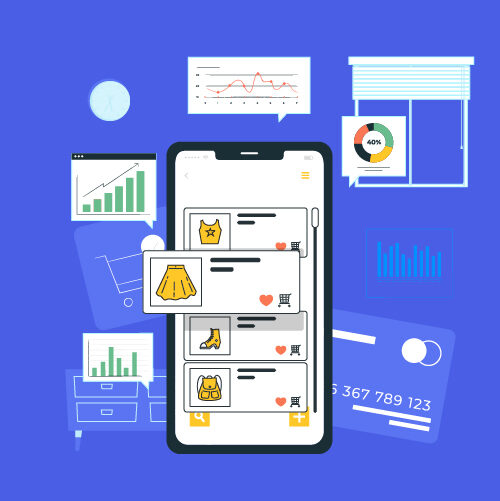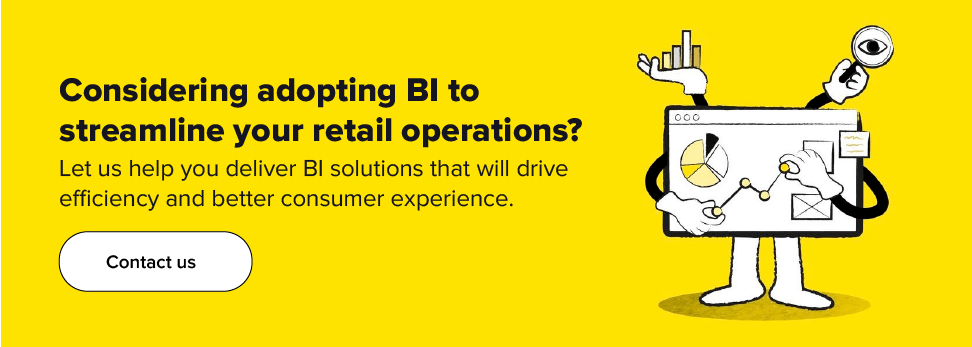- Role of business intelligence in the retail industry
- Key benefits of Business Intelligence (BI) in the Retail Industry
- Improves business operations
- Enhances customer experience
- Helps optimize inventory management
- Identifies emerging consumer trends
- Helps to optimize store floor plans
- Takes marketing to the next level
- Boosts efficiency in the supply chain
- Real-world examples of retail businesses using Business Intelligence
- How can Appinventiv help you in your BI journey?
- FAQs
Retail is one of the most data-driven industries globally, so using business intelligence tools to understand customer behavior, estimate inventory needs, and build forecasts is the life’s blood of any retailer.
BI helps retailers organize, analyze, and contextualize business data from around the company. It also provides reports, performance measures, and company trends that help businesses make informed decisions in the present day.
With the worldwide business intelligence and business analytics software market expected to reach 17.6 billion dollars in 2024, it goes without saying that BI can certainly benefit the retail industry specifically.
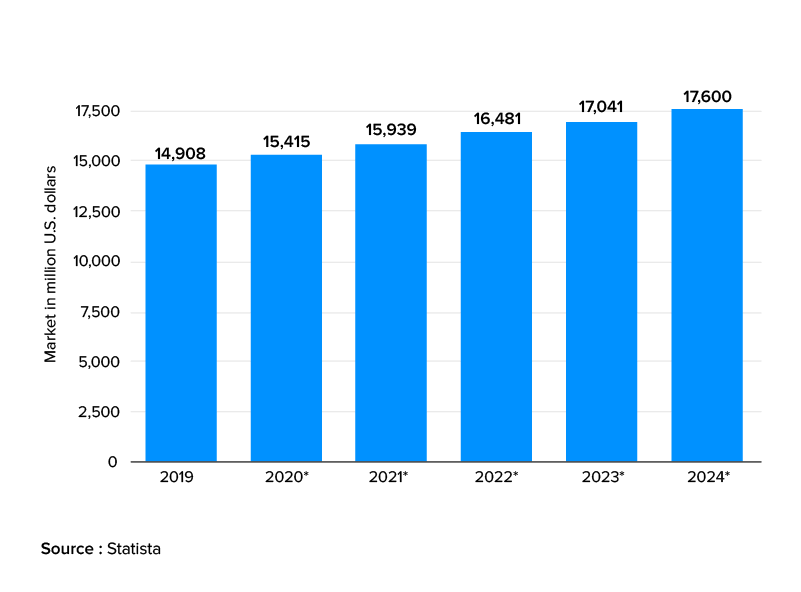
Business intelligence allows retailers to take advantage of new opportunities to predict sales and see the market potential and understand customers on a deeper level.
While you might have got a brief idea about why BI in retail is necessary, in the following sections, let us discuss in detail the role of BI in the retail sector and its countless benefits for your business.
Role of business intelligence in the retail industry
The retail industry is more competitive and fast-paced than ever, and when it comes to staying ahead of the competition, there’s no such thing as having too much information.
Business intelligence in the retail industry helps track how customers interact with eCommerce stores, and this information can be used to enhance the customers’ shopping experience. For instance, a customer gets suggestions based on previously viewed items.
With business intelligence, retailers can also make smart and efficient decisions based on customer behavior. Data can be viewed in real-time, allowing businesses to make changes in merchandise offerings or adjust prices quickly.
This information can be also used by brick-and-mortar stores. They can use BI to balance inventory between online and in-store stock and provide cost-effective shipping options such as picking up in-store or buying online.
For instance, many brick-and-mortar stores such as Home Depot, Walmart, and more are using BI to offer shipping options that are cost-effective and manage their inventory effectively.
Expanded access to valuable operational and customer data also helps businesses create a consistent experience across all channels. Additionally, BI also helps to predict when the stock will run out so that retailers can get ahead of ordering and make better-merchandising decisions.
Key benefits of Business Intelligence (BI) in the Retail Industry
Brands that can tap into good customer service and personalization in today’s market can deliver 5.7 times more revenue than competitors.
But how can you know about your target customers and what they desire? This is where business intelligence comes to play. It allows companies to absorb mass amounts of data about their business – from sales to market trends, customer behaviors and needs, and more. This, in turn, helps you to connect with your customers.
Here are a few additional benefits of business intelligence in the retail industry. So, let’s dive in!
Improves business operations
Using BI tools allows retail businesses to have greater control over their operations. It helps them keep track of what’s going on in the company. This allows making rapid corrections in case of any errors.
For instance, a retail company can use the BI tool to deal with late deliveries and know why delays occur. This kind of information in their operations could help the company vastly improve its services.
Enhances customer experience
Excellent customer service is the key to success for any business. It adds business value, helps retain customers, reduces employee turnover, and increases brand loyalty.
However, offering exceptional customer services can be challenging, especially if a business has a large customer base and fewer employees. It can be a quite difficult task for a retailer to engage employees and keep customers happy while running a profitable business.
Businesses can mitigate these problems as well as keep their customers happy by automating customer service the right way using BI tools. Automation offers valuable data to businesses to make informed decisions.
For example, retailers can use customer analytics from a BI tool to understand the needs of their customers, meet their expectations, and identify opportunities for improvement. These analytics can also help marketers create a data-driven customer journey map by giving insights about how customers interact with products, websites, or businesses.
Helps optimize inventory management
Inventory management is the foundation of any well-functioning retail business. It encompasses all activities related to stock handling – from sourcing to storing to selling inventory and finished goods.
Any retail company that holds stocks is faced with several inventory challenges. From inefficient tracking to overstocking issues, managing inventory can be quite challenging for retailers.
However, investing in a BI and data analytics solution can help in inventory management and solve most of the stock-related challenges that retailers face. With a BI system in place, retailers can maintain optimal stock levels, reduce inventory costs, and improve order management and order processing.
BI allows retailers to classify their merchandise based on Selective Inventory Control (SIC), also known as ABC analysis. Using this approach, retailers can identify the items that have a high impact on inventory costs. It divides the inventory into three categories A, B, and C. While A is the most valuable, C is the least important.
Organizations can also predict overstocking situations before they become a significant problem by using BI analytics.
Identifies emerging consumer trends
BI has become crucial for identifying new and emerging consumer trends.
Take Covid-19, for example. The pandemic outbreak caused a shift in consumer behavior with an increased focus on health-related products and services. Increased consumption of healthy foods like eggs and dairy was seen as a perfect opportunity for retailers to rework their offerings to ride the changing consumer demands.
Another perfect example is clothing brands that have hopped onto the consumer trend of branded face masks and started creating more hygienic products after receiving large demand from consumers.
BI in retail allows identifying patterns in their consumer purchasing behavior, allowing marketing teams to rework pricing strategies and inventory to increase revenues and maximize margins.
Helps to optimize store floor plans
One of the main reasons retailers opt for BI is to design a floor plan that can tempt consumers to shop for longer. Businesses should choose a floor plan that allows customers to shop without hassle.
With the help of BI software, retailers can determine whether the selected floor plan is sufficient for the floor size and product types. They can analyze various data sets using BI solutions (number of stops, visits’ duration, etc.) and recommend a floor plan that will help consumers to find products with ease.
Takes marketing to the next level
With many social media tools and marketing platforms available, marketing has become an increasingly data-driven industry. However, to get the best result from a marketing strategy, organizations need to have a system in place that can provide useful insights and analyze data into the consumers buying behavior. And this is where BI tools come to play. They make a company’s marketing strategies more effective.
By using BI analytics for marketing, companies gain in-depth insights into their customers’ preferences, interests, and attitudes. These insights help them design marketing campaigns and advertise on the right platforms.
For example, if a retailer wants to capitalize on Facebook ads, a BI solution will provide relevant metrics such as page views, likes, on-page actions, etc. Moreover, a BI tool can identify trends and data patterns that can help to increase Facebook likes and click-through rates (CTR).
Boosts efficiency in the supply chain
Supply chains become more complex as retailers involve more merchants and sell more of their products. The sourcing of merchandise, as well as the different distribution channels, make the supply chain in retail ripe with inefficiencies and underperforming departments.
However, with the help of BI in retail key insights can be gained from day-to-day operations. This allows retailers to create better forecast models as well as identify key logistical bottlenecks that should be addressed by the supply team to meet their organizational KPIs.
[Also Read: How mobile apps can add value to your retail business?]
Real-world examples of retail businesses using Business Intelligence
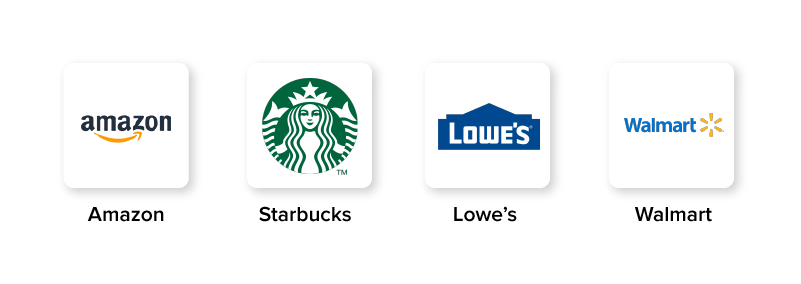
By now, you might be clear on how business intelligence enables retail businesses to organize and analyze business data from around the company and make informed decisions.
Further, let us go through some business intelligence examples of real companies to see how this business solution is becoming a game-changer for the retail industry:
Amazon and BI go hand-in-hand: The company uses business intelligence to personalize product recommendations, market products, and make logistical business decisions. In fact, in-depth data analysis is the key reason for the smooth functioning of Amazon’s massive supply chain.
From allocating inventory among warehouses to optimizing shipping routes, BI tools influence practically every step of Amazon’s supply process.
[Also Read: How much it costs to build a marketplace like Amazon?]
Starbucks leverages BI: Using the retail business intelligence software, Starbucks predicts what purchases and offers a customer is likely interested in. The company informs customers of the offers it believes they will want to take advantage of. This system lets Starbucks draw existing customers into its stores more frequently and increase its sales volume.
Lowe’s is big on BI, too: The home improvement company uses BI to optimize their supply chain, analyze products to identify potential frauds, and solve problems. They also use BI to discover deeper insights that lead to better product assortment and staffing at specific store locations. For instance, Lowe’s uses BI tools to load trucks specific to individual zip codes, so the right store gets the right amount and type of product.
Walmart gets in on BI: The retail giant uses BI tools to understand how online behavior influences in-store and online activities. Walmart can understand customers’ purchasing patterns using BI tools. For instance, how many people searched for a particular product and then bought it from the Walmart app/website on the same day. This way, they are able to pinpoint the busy days and the exit points in their users’ journey.
How can Appinventiv help you in your BI journey?
The advantages of utilizing business intelligence in the retail industry are endless. From offering clear insights into business trends to improving customer experiences, the implementation of BI can enhance your business’s proficiency.
At Appinventiv, our highly-experienced team of retail software development professionals will help you implement the retail business intelligence software for your business while taking care of all your data challenges at the same time.
So, in case you are looking for top-notch business intelligence services, you can consult and hire our experts. We will have all your needs covered!
FAQs
Q. What is retail business intelligence?
A. It is a technology-driven process of translating raw data into meaningful insights to improve productivity and support better decision-making in the retail sector.
Q. How does the retail industry use business intelligence?
A. BI is used to collect, analyze, and present pertinent business information. It also helps to generate personalized communication for customers using their past purchase histories and area of interest.
Q. What are the benefits of using BI in the retail sector?
A. Some of the key benefits of using BI in the retail industry are identifying customer trends, optimizing store floor plans, and enhancing customer experience.



How Business Intelligence is Driving Data-Driven Decisions in Manufacturing
As the manufacturing sector becomes increasingly intricate, leveraging data effectively has never been more critical. Manufacturers today navigate a labyrinth of processes, technologies, and human capital, all while striving for greater efficiency and innovation. This is where business intelligence for manufacturing emerges as a game-changer. By transforming complex datasets into actionable insights, BI enables organizations…

How data mining helps in business intelligence
Data is the life-powering proverbial blood that empowers the corporate economy of the 21st century. And although it may incite fanciful scenarios to mind with a mere mention, the truth is data is key to unlocking human productivity in every sphere of life. Climate change, business failures, epidemics, and crop production, all can be understood…
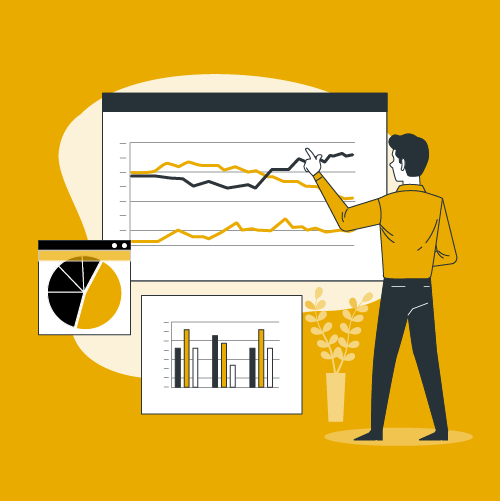
BI for financial services - How to build a successful BI strategy for your FinTech business?
Considering the volume of data financial service sectors disperse across applications, achieving a 360-degree view of customers and business as a whole can be challenging. This is where business intelligence for financial services comes into play. A robust BI solution for a financial services business helps convert a large amount of data into actionable insights.…






